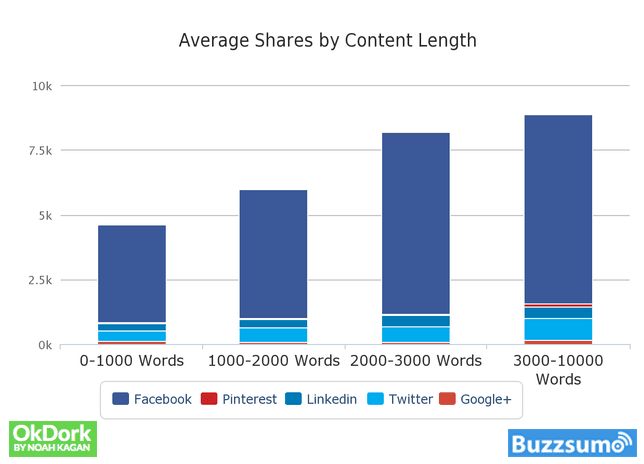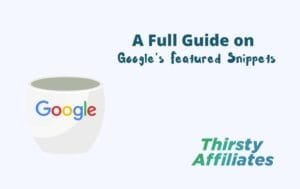Contents

If there's one thing we can absolutely guarantee, it's that every affiliate wants lots of traffic. In general, more traffic equals more money.
The best source for generating free traffic is through search engines. Therefore, knowing the 80/20 of affiliate SEO is very important for affiliate marketers.
What is the 80/20 Approach to Affiliate SEO?
There's a lot written on the topic of 80/20 analysis. But if you boil it all down, it says that 80% of your results will come from 20% of your actions. Or, 80% of what you do is irrelevant to the result.
So, when we say this is the 80/20 guide to affiliate SEO, it means that we'll be focusing only on a subset of SEO techniques (the 20%) that will get you most of the way there (the 80%).
There are 3 steps to affiliate SEO:
- Clever keyword selection
- A solid approach to content
- Growing your rankings over time
As an affiliate, you want things to be as hands-off as possible. That means you need to spend most of your time creating things that will continue to get traffic for as long as the content is still useful.
The traffic you receive from search engines is as close to a consistent source of traffic as you're going to get in this day and age of internet marketing.
It's also a traffic source that has a very low burn rate (unless you dabble in grey-hat or black-hat techniques). Once you're ranked on the first page, search engine traffic has the ability to keep on growing if you follow a few simple rules.
3-Step Affiliate SEO Strategy that Will Get You 80% of the Way (or More)
For this to work, we're going to assume a few things first:
- That you've already picked your niche or have an idea about what niche you want to get into
- That you're interested enough in your niche that you're not going to give up
- That you're prepared to write and create content yourself at the start
If you've taken the time to select your niche and will dedicate the time to create content that will reflect your interest and sell another's service or products, then you're ready to get started.
Step 1: Pick Keywords that are in the “Sweet Spot”
SEO competition today is as fierce as it's ever been at any point in the past.
Every day that goes by means there are more articles than there were before and more competition for things that people search for.
The competition for the big keywords that deliver hundreds of thousands of visitors each month is ridiculous. But not only that, those keywords are continuously being fought over by the biggest SEO firms and experts in the world.
SEO firms typically have more knowledge, more resources, and are generally better equipped to win the battle.
But there is still a way for you, the little guy, to compete and get your content noticed by the search engines.
One way is to look for the “sweet spot”.
The sweet spot is when a keyword (or a group of related keywords) has total traffic between 100 and 1,000 unique visitors per month and the existing results are less than satisfying to the searcher.
If you go for keywords with this amount of monthly searches and not the bigger, scarier keywords with thousands of visits per month, you're going to have a much easier time and see success much earlier. These are the keywords that are currently under-served and will continue to be under-served in today's search engines.
Here's another reason:
New and smaller sites are harder to rank on big keywords because they don't have a large history of backlinks and proven traffic. This is something Google and other engines look for when ranking you for a keyword.
Keywords found in the “sweet spot” often only require one or two backlinks (if any) to rank within the top few positions.
Finding and using sweet spot keywords in a brand new article can land you within the top 10 inside of a week. That's because the current results are under-serving the searches and Google's algorithm already knows that. They're constantly looking for something better, and once you appear they'll adjust.
Later, we'll take you through what to do once you crack that top 10, but first, we have a problem…
The Problem: How Do You Find Out the Search Volume of a Keyword?
There are many solutions ranging from free to expensive.
Keywords Everywhere is a free browser extension you can use to find the volume of searches for an individual keyword:

Just like the name suggests, once installed, you'll see that it shows you keyword volume data all over the internet wherever keywords appear.
You'll see monthly search volume data for:
- Anything you type into Google searches
- The related keywords list down the bottom of the search results (the alternatives that Google shows you down the bottom of the search page)
- The auto-complete suggested searches (that Google show in the search box when you start typing)
- Amazon.com searches
- Bing searches
- And more!
If you can see this information at a glance, it's more useful. Keywords Everywhere is a very effective way to quickly find keywords and judge their worth immediately by their search volume.
If you're interested in other keyword research tools, check out this great video from Pat Flynn of Smart Passive Income. He goes over a number of other tools in-depth (though despite the video title, some you do have to pay for).
Step 2: Write Detailed Guides
When you're writing content for a particular type of person, you should be thinking, “How do I make this the most incredibly useful piece of content that could possibly be found on this topic?”
Writing big guides using a word count of roughly 2,000 to 5,000 words is a good way to ensure that you cover a topic in-depth. According to this article on Noah Kagan's website, BuzzSumo analyzed over 100 million articles and found that longer articles are more likely to be shared:

They actually found that articles of 3,000 to 10,000 words were shared the most. But let's apply some of that good old 80/20 logic to this again.
Based on the chart above, as long as the article length is over 2,000 words, you're going to capture a vastly greater amount of shares compared to articles under that.
How Do You Work Your Keywords In?
The worst mistake you can make is to over-stuff your keywords in your article.
As a guide, your articles should feature the target keyword/s in:
- The article title
- The SEO title and description
- The URL slug of the article
- Within the first couple of paragraphs once
- In 1 or 2 of the H2 headers
- And if you can swing it, in an H3 header as well
The Yoast SEO plugin for WordPress is an excellent SEO tool to ensure the proper use of your keywords.
When is the “Detailed Guide” Approach a BAD idea?
It seems like everyone is using massive 5,000+ word articles these days to rank. But do you always need to write such massive tomes? Is it different for different keywords?
While Google and other search engines do love long-form, comprehensive content, sometimes you don't need to write such a massive post to rank well.
Here's what Mark from Authority Hacker has to say on this topic:
“Google are taking an AI first approach.
Answers to questions should be simple, well-formatted and easy to understand.
There is no point writing 5,000 words for a question that can be answered in 500 words.
You should be aware that content length varies with different types of queries.”
In a nutshell, don't write long articles just for the sake of it.
DO: Use your long articles wisely to rank for keywords (or groups of keywords) about a topic that you can provide a mastery-level guide for.
DON'T: Use them to rank for simple questions that could be answered in just as much depth with much fewer words.
Step 3: Add to Your Content Over Time
Who says you have to write once then leave it never to be touched again?
The beauty of the internet is its ever-changing nature, and you can bet that Google accounts for that. Rankings change constantly.
You should be updating and adding to your big guides over time as things change, new evidence comes to light, better sources appear, and (here's the kicker) as you come up with additional content to add.
You can consider adding new content such as:
- Videos
- Podcast audios
- Infographics
- PDF downloads
- Report downloads
- Statistics
Make sure everything is tightly related to the topic of the article. The more you add to it, the better it will rank and improve in the rankings.
What About the Final 20%?
So, that's the 80/20 affiliate SEO guide in full.
You might be wondering where the final 20% should be spent if you really want to push things ahead in your SEO.
The final 20% of SEO is split between building links and other advanced SEO methods.
Building backlinks is not something we are going to cover in this article because the topic is deep. Very deep.
For that, we highly recommend reading this link-building guide and watching this video by Brian Dean from the website Backlinko.
As for whether you should spend the extra time chasing that final 20%, it's entirely up to you.
If you have a strong interest in SEO, and you want to further your results, it might be worth the time.
That extra 20% push could deliver outsized results, and you'll always be well served by learning more about this interesting art that is SEO.
However, if you're just starting out, you may want to start with the 80/20 guide we've just outlined. Give it a try and if you aren't getting what you want out of it, go back to the drawing board and see what else you could be doing to help it along.
Do you have any questions about the 80/20 approach to affiliate SEO? Let us know in the comments!
If you liked this post, be sure to follow us on Twitter, Instagram, Facebook, Pinterest, and LinkedIn! And don't forget to subscribe in the box below.



Great guide Josh,
It is easy to get lost on what you’re supposed to do with affiliate SEO. Making great content, thinking of new content ideas, even outsourcing things can be a headache!
It’s good to focus on the “big wins” like what you mention and everything else will follow.
Thanks Jeremy! Glad you liked the article. Yes, people tend to get bogged down on tactics and forget about the big wins. Hopefully this will help some folks.
Thank you for this very useful information.
You’re welcome Calvin, thanks for stopping by!
Thanks for the great article. I think the 80/20 rule applies to many areas. And for SEO definitely. Many of the tips that you read on the internet are overrated in my opinion.
Too right Pflanzen! Glad you enjoyed the article 🙂
hi I’m writing to you from Italy and I’m in a hurry to monetize my blog. 🙂 you have suggestions on which plugins to use (besides yours) articles that I should read etc etc
Really such amazing concept you discuss here “80/20” rule.
I am getting serious knowledge on affiliate marketing & SEO from your blog…and I am also using your plugin “thirsty affiliate” it just awesome.
Thanks again for your helpful guide.☺️
That’s a great tutorial. I don’t know sometimes I just can’t believe how simple it can be while other overcomplicate everything. But isn’t it to much write write 2000-5000 word articles, for keywords with 100-1000 searches. I mean would it be worth the effort?
It’s a great explanation about SEO. It’s very detailed and helps me to make a better. Keep up your good work. Thanks for sharing.
Cheers
Hi, truly informative post, your tutorials on the SOE is insightful and I have learn quite a bit from it. I new at blogging and your your post is a great guide for me. the 80-20 concept is really opening up my mind to blogging and posting quality content. Appreciate all knowledge that you have imparted. BTW, I think , I end up reading your post about 3 times. Never done that before. Thank you.
I really like Backlinko’s guides, they are just the best!
Thanks for publishing a nice article, I had created an affiliate website on which I was trying to sell VPN but there is no more scope in it.
This article is very useful, thank you.
I came across this site because I am new to this topic and I wanna say thank you for sharing your thoughts and content.
The article has extremely quality content I appreciate it, surely your article will bring a lot of useful knowledge to everyone. respect you
Great clarity about SEO. It is very specific and helps others to do better. Keep up the good work. Thanks for sharing.
Hi Thirstyaffiliates Team,
Thank you for this awesome guide! I will definitely take a look at this
just landed and discover many resources on this blog to monetize our site, –from the owner of great affiliate plugin. And as a beginner affiliater, i think I have to combine all those techniques with my self patience, is that right ?
Excellent details. We completely agree with you that it is important for any blogger to help their visitors. Thanks for your valuable content.
Have a good day.
Good pointers. Need to incorporate these concepts fast
This post makes me understand more about Affiliate SEO, but I’m still curious about the steps. Can u explain me?
Thanks for sharing this valuable guide!
This article offers helpful tips and strategies for optimizing affiliate websites for search engines. It provides valuable insights into how to improve SEO practices to drive more organic traffic and increase affiliate sales.